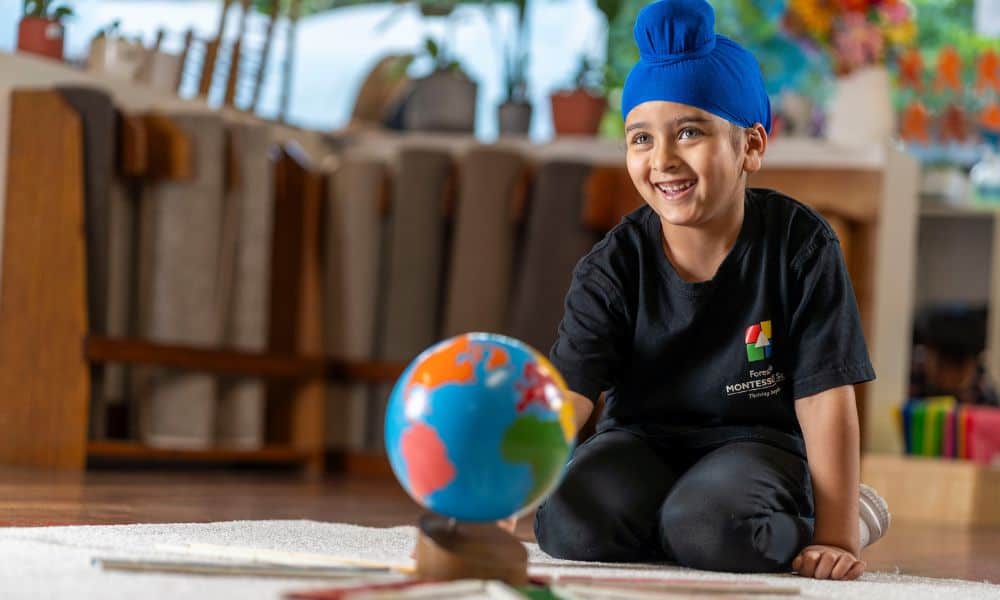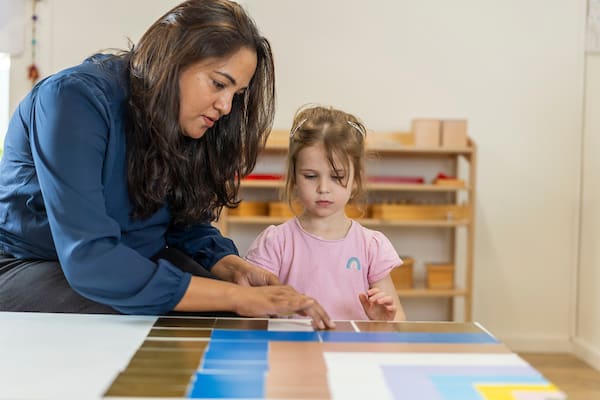“Preventing conflicts is the work of politics, establishing peace is the work of education.”
Dr Maria Montessori
As we celebrate the International Day of Peace this Saturday, we remind families of our mission at FMS: We are a school educating for Peace.
Having lived through WWII, Maria Montessori was passionate about how to help the world towards peace.
Peace is woven throughout every aspect of the Montessori curriculum.
Sometimes the lessons are direct; at other times they are more subtle. The mission is always clear: we want children to have a wide view of the world. We want them to appreciate the diversity of others. We want them to have the tools to navigate this world peacefully.

How do we approach this critical task?
Montessori schools teach peace both directly and indirectly. We talk about peace and its importance openly and frequently. We talk about what peace means, what it looks like and what children can do to become peacekeepers.
Perhaps most importantly, we model peaceful behaviour. Through our words, the tone of our voices, and with our actions, we show children what it means to be peaceful. They watch our everyday actions and learn so much from them.

A Global view of peace
From the start of the preschool cycle (ages 3-6), Montessori children begin to learn about the world and all the different people who occupy it. They explore environments, continents and cultures, developing their sense of geography through this whole world vision. These studies often include learning about biomes and connection of all things, instead of an emphasis on political boundaries. Teaching about the world in this way gives children a sense of the natural world, people, communities and what connects us, rather than the division of countries.

Embracing a Variety of Cultures
Primary aged Montessori students enjoy these lessons with timelines and history. They learn about the origins and development of humanity. Studying ancient cultures is a fascinating part of primary education for this age group.
An important aspect of these primary level studies is exploring the fundamental needs of humans. Students explore how groups of people around the world share the same basic needs – again, elements that connect rather than divide humanity. Physical needs, such as food, shelter, defense, and transportation are considered, as well as spiritual needs like art and religion. Our primary students enjoy learning how people from different cultures throughout the ages have met these needs.

Resolving Conflict
With a more open view of the world, of people, culture and community, Montessori students are also actively involved in creating and being a part of their school and class communities.
In addition to contributing through acts of service, grace and courtesy, Montessori students are supported to peacefully resolve conflict as they arise.
Conflict in the classroom or playground is natural and unavoidable. At Montessori however, conflict is an opportunity to educate for peace.
Montessori teachers are equipped to help children resolve conflict effectively. They provide children tools such as micro-mediation with the peace rose or the peace table and help them use words and actions that express their needs and feelings while listening to those of others. These are skills that many adults are still learning!

A peaceful self
As well as learning skills to peacefully resolve conflict with others, Montessori education helps children to find peace within themselves. In a Montessori classroom, children will learn a variety of self-calming strategies. This might include mindfulness meditation, yoga, breathing exercises, or the use of small hand-held tools such as a finger labyrinth or polished stone.
At Forestville Montessori school, we offer and implement a range of self-calming and strategies through our Grow Your Mind program.

Our teachers take time
Often, resolving conflict, calming ones-self or choosing the most peaceful option happens in the moment. It’s not something we can schedule into the curriculum or lesson. Luckily, at Montessori, we are flexible with time. Our classrooms have structure and purpose, but we are not rigid with time. This flexibility lends itself to shifting discourse and having discussions in the moment.
For example, if a group of children are experiencing difficulty resolving a problem together, the teacher is able to stop and sit with them. Without feeling rushed, they can take the time to figure out what went wrong and how to make it right.
A unique feature of the Montessori educator’s role (as opposed to a more traditional setting) is that instead of doling out consequences, the Montessori teacher will take time to work through the conflict with the children. The children are encouraged to reflect on the issue and their opinions are part of the resolution. This is a peaceful community-based activity in which all parties are heard, considered and involved. It fosters connection, collaboration and ultimately, peace.

Peaceful acts for our Communities
As Montessori children get older, they are encouraged to give back to their community. These acts of service and charity will often be inspired by the children’s ideas. Children may collect food and supplies for a local animal shelter, read stories and sing songs to residents of a nursing home, or make and sell baked goods to benefit a cause they believe in.
Our recent Jump Rope for Heart event is a great example. Another example at FMS is ‘The Giving Tree’ where in partnership with Rotary, our children and families provide Christmas gifts for distribution to local charities. On a global scale, we support Montessori schools in Thailand.
By supporting children with logistics, we encourage them to learn how to be active and supportive members of their communities at a young age. They learn the importance of connecting, collaborating and contributing positively to their school and beyond.
Giving back is just one way a child begins their active role as a peacemaker.


